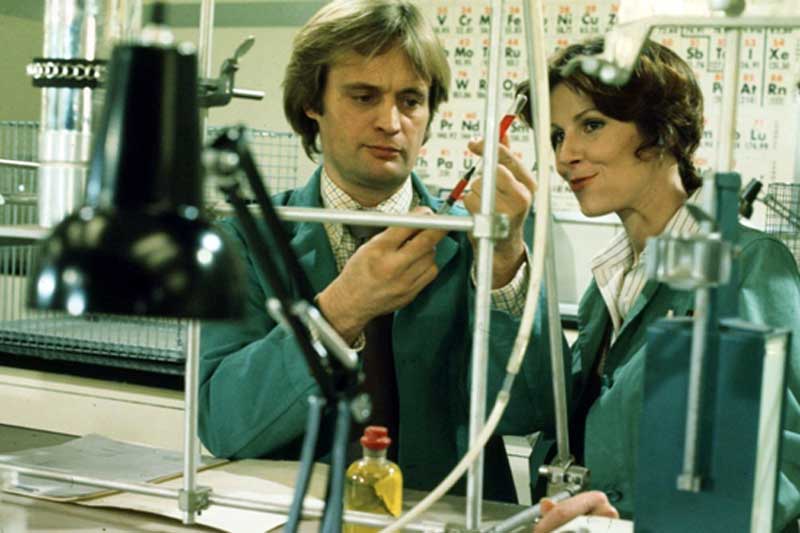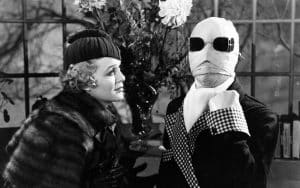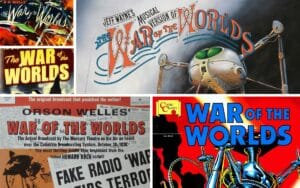JON KANEKO-JAMES looks back on the The Invisible Man 1975 TV series, based on HG Wells’ classic

The Invisible Man 1975 is one of those unsung shows that ends up in the afternoon schedule of UK TV, relegated to the limbo of digital channels like ITV4, and in some ways it belongs there. Like The Saint, The Persuaders and most especially The Champions, it belongs to a grand genre of slightly fantastic daring-do from the US and UK 1960s and 70s.
This was a time when effects were getting cheaper: Peter Vlahos had already invented the earliest green screen process, superseding the difficult, time consuming (and by implication, expensive) process of travelling mattes. It’s probably no accident that Vlahos’ invention coincided with a run of successful sci-fi shows like Lost in Space, Land of the Giants, The Time Tunnel and Voyage to the Bottom of the Sea. That said, although The Invisible Man 1975 uses green screen, it owes much more to super-spy shows like The Man from UNCLE and Mission Impossible.
In the show inspired by the original work by HG Wells, Scottish-born David McCallum is Daniel Westin: a scientist who invents a process to become invisible, finds out it’s going to be used as a weapon, throws a hissy fit, makes himself permanently invisible, and then becomes an agent for the US government (seemingly with no cognitive dissonance whatsoever). Working with his wife Dr. Kate Westin (played by Melinda Fee), Daniel takes on the cases for the secret service, using the money to work on a cure for his invisibility.
David McCallum is one of my favourite actors of the era: I grew up with The Man From UNCLE on TV, collected the Sapphire and Steel VHS tapes when the came out in the 1990s, and I still love his appearances in NCIS. Even seeing him cameo in an early episode of SeaQuest DSV was fantastic (not to mention Babylon 5). David McCallum is an actor I’ve grown up with, and I’m starting to think that he’s given me a TV-related variant of Toxoplasmosis, because no matter what I see him in, I always like it.
And there’s a lot to like: all the episodes on the promo DVD were ones I’ve seen, but when I watched them with my wife (who, being Japanese, had never seen them) she spent the whole time on the edge of her seat. There was genuine tension and some great comic moments (like when Mrs. Dr. Westin helps her hubby to physically puppet an unconscious bad guy), and a lot of little touches that genuinely made it feel as if Westin was an invisible man wearing a skin suit, rather than just a man who can become invisible at will.
The effects are good, for the most part, and there are only a couple of bits that made me smile (like wire work that left objects, supposedly in the hands of an invisible Westin, wobbling in mid air). For the time, The Invisible Man certainly stands up with any of its competitors, including (in my opinion) The Six Million Dollar Man. Their worst, wobbliest bit of wire work certainly beats the pants off The Six Million Dollar Man’s tactic of portraying super speed with slow motion.
The only things that really bothered me about the show were in the scripts. Firstly, from the off, the show is formulaic: the Westins are presented with a case, Daniel persuades Kate to throw herself at the villain of the week, Daniel does something invisible and nearly gets caught, then one of them gets into peril and Daniel solves everything by being invisible.
And secondly, a lot of episodes really do seem to hinge on Kate being prepared to play honeytrap at the drop of a hat. Usually, with Daniel making only the driest and most token of protests (although, he is being played by David McCallum). I know that with Daniel being invisible, there needs to be a face character, but his wife is supposed to be a PhD in her own right. Does her contribution have to be limited to pretending to be hot for every security guard and South American gangster? Not only that, but with her getting pretty much to the objective by her own ‘feminine whiles’ every week I stared to wonder whether that invisible guy was holding her back…
Which brings us to the fact that, as spies, the Westins make a very convincing pair of PhD scientists. Seriously, they go in for dangerous, convoluted plans that don’t have the Mission Impossible ‘work of art’ feel. A big part of the tension comes from the Westins making schoolboy errors, like Daniel panicking during a mission and changing the plan; the pair forget to close the secret door to an art thief’s private vault, and a number of Daniel’s near death experiences come from his waltzing into places without realising that plenty of security systems have things like heat sensors and pressure plates (which rather circumvent invisibility)
And there’s one final thing that will eventually occur to you, whether you like it or not:
Every scene of The Invisible Man 1975 being invisible contains a naked David McCallum. Admittedly, there was no literal naked David McCallum in any of the shots, but at some point it’ll click that every time Westin is invisible, he’s naked. They make a big deal out of the fact that he has to be naked to be invisible.
So yeah, there you have it: naked David McCallum sneaking, naked David McCallum fighting, naked David McCallum taking pictures of things. It hit me about half way through my second viewing of the pilot episode and after that I couldn’t get it out of my head.
And despite all of that, it’s still a great show. It doesn’t matter that Daniel Westin largely fights crime naked, that he seems to get off on watching his wife with other men, or that they’re really just not very good at being spies. The premise is fun, the characters are charismatic and the stories are worth telling.
You can’t ask for much more, really.
Listen to The Invisible Man 1975 TV series theme
What did you think of The Invisible Man 1975? Tell us in the comments section below!






This was a thoroughly engaging article simply because I, too, was brought up on a very similar diet of TV. And yes, I agree, David Mccallum consistently provided convincing performances that elevated even the most mediocre scripts to something riveting. I was captivated by McCallum’s roles at a very early age; his performances as Second Workd War officers in Colditz and The Great Escape. Then, like you, onto The Invisible Man and Sapphire and Steele. Even today, he always manages to imbue his roles with intensity, almost Quatermass-esque scientific rationale, steely determination and humanity. One of the finest. Regards, Paul
I first saw The Invisible Man series when I was nine years old in 1975 and it immediately became my favourite programme. After decades of wishing and hoping that it would be repeated on TV, and it never was, I finally got to purchase the 4-disk DVD set several years ago, and I’m now re-watching the full set for about the third time. I still believe this is one of the best TV shows ever made, and I completely disagree with all the bad reviews I’ve heard about it being dated, having poor scripts, repetitive plots, etc etc and can never understand why it didn’t last longer. I found ALL the episodes exciting and humorous with good plots and wonderful special effects, and hilarious scenes such as the drug villain’s cases opening and spilling their contents, the bicycle riding itself and the dog going mad at seemingly nothing. I especially liked the clever plots where Dan lent his mask to others in order to let them escape, whilst he escaped unseen alongside. Loved Daniel’s character and super-cool haircut, and Kate was just lovely and all the other actors great. The way this show was produced reminds me of Columbo, that nice easy-going 1970’s style which I love so much, not like the noisy OTT production you get nowadays, fully of crashing, whooshing, loud music and swearing. Check out Survivors, that was also an excellent mid 1970’s series.